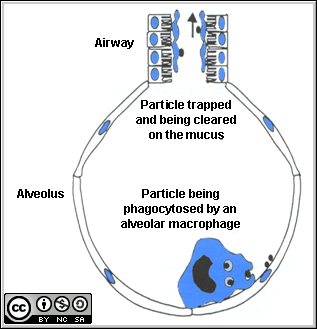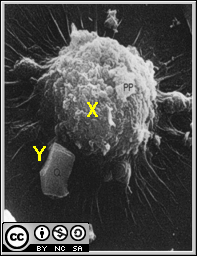 |
| Module 4: Lung Defences Against The Environment - Alveolar Macrophages |
 |
| Module 4: Lung Defences Against The Environment - Alveolar Macrophages |
The Alveolar Macrophage is an important scavenger cell that is especially critical in defense against infectious agents. It kills bacteria and viruses by phagocytosis and destruction within lysosomes. It can then present their antigenic fragments to the immune system. Lung macrophages often kill small numbers of bacteria without further stimulating inflammation or immunity. This is lung protective.
Stimulation of excessive inflammation or immune response can be harmful to the delicate gas exchange units. Anti-proteases such as alpha-one antitrypsin and antioxidant systems exist to limit damage to the adjacent tissues from the effects of activated macrophages and neutrophils.
 |
 |
Particles that avoid the defences in the airways penetrate to alveolar level where they may be deposited. Resident alveolar macrophages phagocytose such particles and either migrate into the mucous layer or cross the respiratory epithelium, into the lung where they can migrate along lymphatic channels to regional lymphoid aggregates or lymph nodes. The panel above (on the right) above shows an alveolar macrophage (X) about to phagocytose a quartz particle (Y).

Postgraduate Diploma in Occupational Health (DOH) - Modules 3 – 5: Occupational Medicine & Toxicology by Prof Rodney Ehrlich & Prof Mohamed Jeebhay is licensed under a Creative Commons Attribution-NonCommercial-ShareAlike 3.0 Unported License.
Permissions beyond the scope of this license may be available at http://www.healthedu.uct.ac.za/